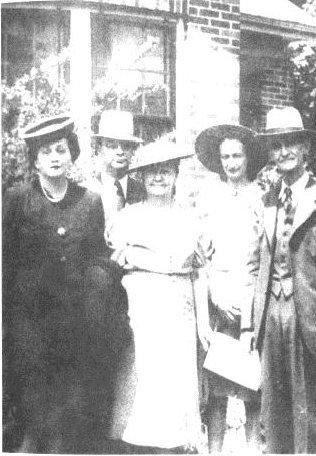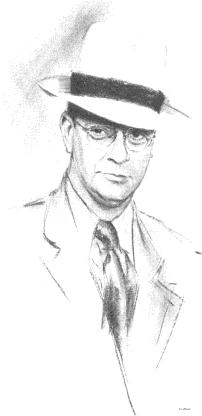
AUDIO
PRESENTATION Part
2 
THE SOUTH IN A CHANGING WORLD
Commencement
Address by W. J. Cash - June 2, 1941
at the University of Texas,
Austin
(Second Part of Text Included Below)
Part II - 14:48 (Two Parts),
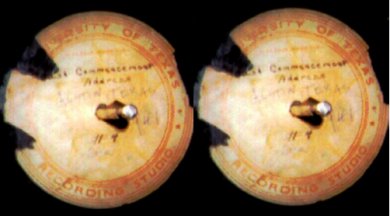
|
If the player box appears above to the left of "Player Control", then the speech is downloading and will eventually begin automatically. (If you do not see the Yamaha player, try reloading your player software on your computer.) Depending on the speed of your connection and computer, the speech will take from three to ten minutes to download during which time you can familiarize yourself with the contents of the text below or open another copy of your browser. (To do so automatically, if you have not already done it, return to the homepage and hit the appropriate "Pre-Load" link at the audio menu to return to this page in a separate window; then simply leave this second window open while you proceed in your main browser. The speech will eventually begin automatically. If you leave this page, however, and do not leave a second copy of it open, downloading of audio terminates.) When downloading is complete, "Downloading Now" disappears from the window and the black arrow button becomes solid. Press the black dot button to stop, and the vertically lined button to pause. To start and replay, press the small right arrow. Adjust volume locally on your computer. The best sound is achieved by playing recording through headphones or external speakers. (Note on playing audio: You will need to obtain a free download of the Yamaha SoundVQ® Player to play the streaming audio from this page. Be sure to download the player; the encoder, also available at the site, is for recording compressed audio only and you will not need it to play the Cash Commencement Address. Download the correct player for your computer; the player works on either a PowerMac running System 7.5.1 or higher or a PC Pentium 66mhz or higher running Windows 95 or Windows 98, with at least 16mb RAM. The size of the Player is under 1.5 mb and should take less than five minutes to download on a 56kbs modem and about eight minutes on a 28kbs modem, depending on traffic.) Go to Player |
Go to Quick Navigation Bar at Bottom of Page for Other Sections of Site
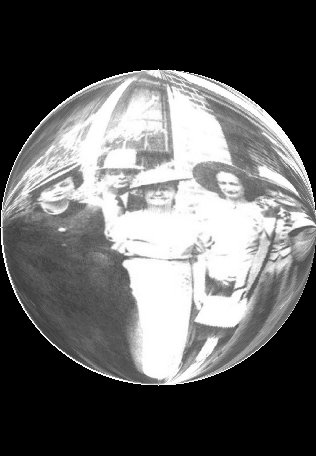
"We are
no more than a moving row of magic shadow-shapes that come and go."
--The
Rubaiyat
Hyperbolized alteration of last photo ever taken of Cash with his family, l. to r., wife Mary, Wilbur, mother Nannie, sister Bertie, father John W. (Original photo taken by brother-in-law Charles H. Elkins on Cash's last Sunday in Shelby, beside family home at corner of Morgan and Sumter Streets, May 25, 1941) Cash was buried six weeks later, two blocks away in Sunset Cemetery. The quoted phrase was used, substituting "fantastic" for "magic shadow", to introduce Cash's first short-lived weekly column for The Charlotte News in 1928, titled "The Moving Row".

(Matches audio contained at this location)
Some of them by the time of the Civil War were genuinely aristocrats. Others were on the way to being such. But the great majority, even of the ruling orders, were not aristocrats. Yet the claim to such rank was virtually coexistent with ruling orders and often reached down below them, because the Old South was in the last analysis a society which stood on the defensive.
Torn between two powerful impulses—moral disapproval of slavery on the one hand and powerful self-interest, economic self-interest, on the other—the South had begun to retreat into unreality, to romanticize and sentimentalize itself and its peculiar institution. That tendency to unreality, to romanticism and sentimentality, was its most striking trait, I think. It extended through the whole of Southern life and impressed every part including religion and morality. By the time the Civil War came on, the best brains of the South were preoccupying themselves with such futile projects as trying to prove by the Bible that God had ordained the Negro to be the slave of the white man. [Ed. note: see, e.g., Scriptural and Statistical Arguments in Favor of Slavery by Thornton Stringfellow; and Nellie Norton: Or Southern Slavery and the Bible, by Ebenezer W. Warren] And while the ruling—while the official ruling Southern moral code was that of Puritanism, the conduct of many of those who professed that code was often anything else but puritanical.
Mind you, I am not accusing the Old South of hypocrisy. Hypocrisy is a coldly calculated, conscious thing, and the South was not consciously engaged in double dealing. Merely it was responding to a situation which it found impossible to face, precisely as any other people would have responded, by retreating toward unreality.
But of course the Old South had other qualities besides this one I name of unreality and tendencies to romanticism and sentimentality. Many of them cannot be mentioned here because of the limitations of time. But one of them deserves special notice: I mean the characteristic of extreme individualism. This quality had extremely deep roots. The effect of the survival of the tradition of the frontier is obvious and I shall not labor it here. But it also has to be noted that most Southern white men retained some sort of land, this land absorbed naturally by the plantation. But lands that were good for the growing of corn for food and for a little cotton for clothing were pretty well universally possessed by Southern white men. And that's to say, of course, that they retained their independence, and independence is naturally the soil in which you get extreme individualism.
With that background we come to the great disaster of the Civil War and Reconstruction. The march of the Old South towards an aristocracy was ended, towards a plantation aristocracy was ended. So was slavery. But for the old proud sore defensiveness in attitude which we had before the War, we now had added--we now had a much more developed sort of thing, the sensitiveness of a defeated people. If slavery was gone--in the North, well-meaning and not so well-meaning men were demanding that the Negro should suddenly acquire not only equal rights with white men, but often even superior rights. To that the South responded as any other people would have responded, given the same tradition and the same environment. Often that response was violent and brutal. And so much was to be expected from them, from men with a long tradition of the frontier behind them.
The South had always been violent. It was violent before the Civil War. Lynching and the duel both flourished there as it flourished nowhere else in America. But let us understand in saying that that we are simply trying to understand something, not to pass moral judgment. Faced with the same problem, given the same environment and background, the North would have responded very much as we did in the South. The violence, of course, is incidental.
What I want to emphasize most is that the South’s tendency to reality [sic]—to unreality, to romanticism, to sentimentality, was enormously reinforced by the Civil War and Reconstruction. If the movement toward the plantation aristocracy was ended, if even the people who had already achieved aristocracy were more or less being extinguished--yet in this period the South would accept such a notion of aristocracy in the Old South, with far greater vigor than ever before--again as an obvious defense mechanism against the Yankees.
The idealization and sentimentalization of the past is of course a normal enough thing for defeated peoples, and so is fierce defensiveness in general. Ireland is a good example, and our Southern literature of the Thomas Nelson Page era with Marse Chans and Squire Effinghams, has its parallel in the literature of any of those nations which have been defeated, Ireland or Poland, name them as you please. [ed. note: Cash may say, or mean to say, here, "Marse Chans and Squire Effinghams" as it is written in Mind, p. 124 (Book II, Chapter 1, section 8--see footnote 1 below for quote); but the actual words uttered could be interpreted as "Marse Chans and scribes and Hams". In such an understanding the "scribe"would be an apparent reference to the first person narrative of Page's "Marse Chan", written from the point of view of a passerby to a plantation who comes upon a slave who tells him glowingly of "Marse [Master] Chan" in a dialect set precisely to print by the "scribe" in a plainly racist and condescending manner. "Ham" is another slave, Marse's buggy driver, described by the slave as someone whom Marse Chan has heroically saved from a fire.] In itself, the idealization of the Old South as a country full of dueling gentlemen and ladies in farthingales might not be important. What is important is that the tendency to unreality which is summed up in this attitude extended to all fields of thought and so had the greatest consequences.
Patriotism to the ideas of the South had always been an integral part of Southern defensiveness. Probably it had more to do with the South’s pugnacity before the Yankee than slavery itself. [But now it was enormously expanded. Everything that was Southern became sacrosanct, immune to criticism, an object for pride. Everything that was not Southern became anathema, at least suspect.] [ed. note: Decay of original records prevented bracketed section from being transferred to tape.]
The result of that was that before long these people who had always had land before the Civil War, who had had their independence, found themselves being sold out and reduced to the status of sharecroppers, white tenants, in order to make a living--of course on the terms that were available, and those terms were fixed by the Negro’s competition. But not even the white man’s status of white tenant and sharecropper made him safe from the competition of the Negro. Numbers were so great till it soon became apparent that we were going to have open conflict, and that is fundamentally the reason that the South turned to industrialism.
I say that this is fundamentally the reason. I understand of course that the desire of the early entrepreneurs for profit played a very great part in the industrialization, the rise of industrialization in the South in the 1880’s to 1900 and afterward. But there certainly was also this patriotic motive of providing a sanctuary for the masses of white men. The organization of new cotton mills, factories of any sort in the South, in those early years was often a communal project. In fact, as late as the war period, and in the early 1920’s, that was still true to some extent. And the man who built a cotton mill, who organized it and led the enterprise, was looked upon as very definitely a community benefactor. And he was, of course. He felt that himself, and the people granted him that it was a great public benefaction.
But as time went on, it was no longer necessary to make the sacrifices which had been made in the beginning. Low wages and long hours, child labor probably, were necessary, at least semi-necessary, conditions for the early growth of industrialism in the South, because it had little capital. And the extent to which Northern capital was willing to aid has been greatly exaggerated. It had positively to lift itself by its own bootstraps and to do that, for one thing, they made very cheap products also. To make enough profit on the processing of cheap cotton goods it was necessary to have low wages, long hours, and so on. But time passed and it was no longer so necessary.
With this attitude you see that old unreality, the desire to believe what you like to believe, coming back in there. The man who built a cotton mill still thought himself to be a public benefactor whether or not he was actually doing anything but pursuing his own personal ends. And the attitude of the people remained. Well, that is the explanation, I think, of the enormous hostility that has been shown in the South toward the labor union idea. It was somehow an attack on what we call "Progress", and so an attack against the integrity of the South, the South’s right to defend itself in the world. [ed. note: See The Mind of the South, Index, "Progress" and references noted therein for further understanding of the term, i.e. the notion of the renewed ideal of self-determination, supplanting the old plantation system, through the advent of cotton mills and industry, a "sanctuary for common whites" in the South after the Civil War into the 1920's.]
Now this has been a deliberately critical speech. I haven’t tried to cover the whole history of the development of the South. You can’t do that in one volume, as I found out. It would take a dozen. But what I have tried to do is to suggest some of the main lines of our development and some of the things that it seems to me most important for us to know--to take into account. This is a very great rich land--this Southern country of ours. Texas alone, I believe, has greater resources than all of Europe. Certainly the South is the richest comparable area in the world. Yet we face now a need for renewed sacrifices. As the country moves into the national defense program and we prepare to try to resist totalitarianism, we are going to have to make up our minds there are hardships; but I see no reason at all why we should make up our minds to more hardships, more sacrifices than are necessary under the circumstances.
And it's for that reason that I made this critical speech in which I point out what seem to me to be the vice of unreality, of romanticism, excessive romanticism and excessive sentimentality. I have no desire to attempt to stamp sentiment out of the world. We have had too much of that recently in Europe. But "sentimentality" is a false sentiment which exists for the purpose of hiding something, for dodging something, and it is a very dangerous vice in the South now. Now, as far as individualism goes, why it can be a great virtue, just as the pride that goes with it can be a great virtue, but it can also be very dangerous if it isn’t kept in check by the realization that man after all is a social creature and that none of us has the right to stand outside the social organism.
Thank you.
A speech recorded backwards, transcribed forward: Perhaps, as it were, the proof of the negative...
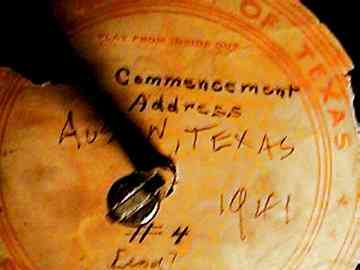
Thanks are due the late Professor Joseph L. Morrison and
his staff for the transcription of the speech as it appears in W.J.
Cash: Southern Prophet, Knopf, 1967, (with some minor
corrections made above to comport with the actual speech and to
enable easier understanding in text form). The charcoal of
Cash appearing at the top of this page is by Manuel Domecq, 1991;
the original hangs in the North Carolina room of the Wake Forest
University Library. (Reprinted from W.J. Cash
and The Minds of the South, ed. by Paul D. Escott,
L.S.U. Press, 1992)
1 The paragraph of The Mind of the South in which Cash makes reference regarding "Marse Chans and Squire Effinghams" reads as follows: "It was in this period that the legend of the Old South finally emerged and fully took on the form in which we know it today. With the antebellum world removed to the realm of retrospect, the shackles of reality, as so often happens in such cases, fell away from it altogether. Perpetually suspended in the great haze of memory, it hung, as it were, poised, somewhere between earth and sky, colossal, shining, and incomparably lovely--a Cloud-Cuckoo-Land wherein at last everybody who had ever laid claim to the title of planter would be metamorphosed with swift precision, beyond any lingering shade of doubt, into the breathing image of Marse Chan and Squire Effingham, and wherein life would move always in stately and noble measure through scenery out of Watteau." (Mind, Book II, Chapter 1, section 8, p. 124 of 1991 ed.)(See In Ole Virginia, or Marse Chans and Other Stories, by Thomas Nelson Page)
